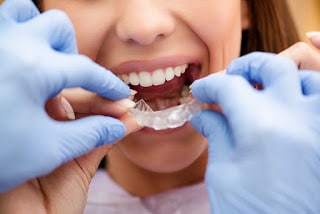TMJ is also known as Temporomandibular, it is what dentists refer to as jaw discomfort and related issues. If you suffer from an issue such as aches around your ear or are having possible difficulty when chewing food, or perhaps you get locked-jaw; which is when it is difficult to open and close your mouth, all these are signs of TMJ.
There can be various reasons why the above things can happen. But some of the common reasons are:
- If you have arthritis, you may have damaged your joint cartilage
- If the disk is out of alignment it may cause to erode over time
- If you have had an impact on the jaw, such as a blow or a fall, this could also impact it.
- A lot of people tend to grind their teeth due to various reasons such as stress or habit.
If you are unsure whether to get checked or not, it is always best to go with the former option- get it checked. Look for a reputable and well-established TMJ Specialist Orlando that is knowledgeable and responsible for rectifying specific issues of the jaw. They will initially offer non-surgical options so you have nothing to worry about.
A few Questions to Ask Yourself
If in doubt, below are 10 simple questions to ask yourself. If you ticked yes to the majority of them (over 50%) of the questions – seek professional advice as soon as possible:
- Do you ever grind or clench your teeth or have you been told you grind your teeth in your sleep?
- Does your jaw feel stiff when you wake up in the mornings?
- Have you had about of headaches or neck aches over the past couple of months?
- When you open your mouth, to yawn or to eat, does it hurt or do you have some sort of pain anywhere in the region?
- Have you had any impact-related injuries that have gone unchecked, such as a blow or a fall to your head, jaw or face?
- Do you have difficulty biting down things because your teeth no longer touch or are in line with each other?
- Do you suffer from lower jaw pain at all?
- Do you have chronic arthritis anywhere on your body?
- Is it difficult to tear food?
- When you chew does you jaw hurt or does it give you a headache sometimes?
It is not always an option to get surgery, and this is usually the option on after all other treatment options have been alleviated and at the advice of your oral surgeon.
Until you get that appointment, it is always best to do a few things yourself such as taking painkillers or over the counter anti-inflammatories, sometimes muscle relaxants can work too. Opting for a more natural way to help such as doing jaw exercises every day can alleviate the pain and make your jaw stronger. Such as relaxation techniques or even stretching exercises have been known to help pain and stiffness. Sometimes if there is already a pain, things like applying ice packs and alternating them with heat packs every couple of minutes and massaging your neck and jaw, resting your jaw when you’re not eating, all of these can help lessen the pain and/or discomfort associated with it.
Prevention is Always Better Than Cure
We have always been advised about this time and time again and sometimes we tend to forget. We are here to remind you of this simple fact.
There are ways to avoid getting TMJ which include staying away from chewing hard substances such as toffee or sugary hard candy. Also chewing gum too frequently can be bad for not only your teeth but your jaw.
In terms of how to eat, not many people enjoy being told to eat with their mouth shut or to chew properly, but these age-old suggestions have been around for good reason! Not only is it important what you eat, but also how you eat. Avoid chewing food on only one side of your mouth, it is important to use both sides equally to chew your food.
If after trying all these basic techniques and nothing helps, the logical next step would be to go see an expert.








